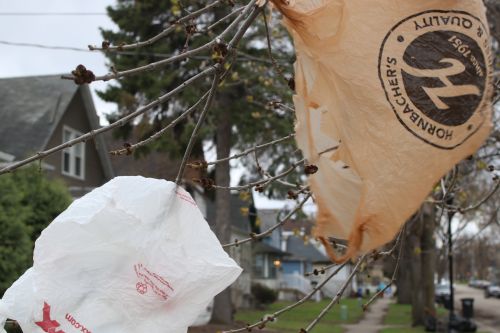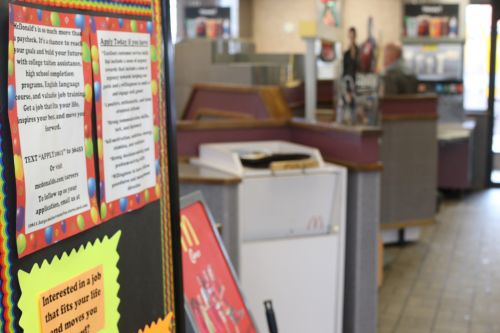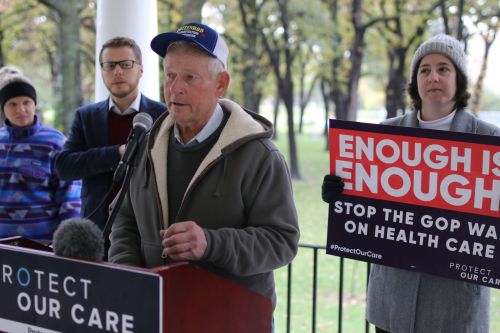News | May 1st, 2019

BISMARCK – ALEC’s fingerprints are smeared across more than a handful of preemptive state strikes – now laws – from the 2019 Sixty-sixth Legislative Session of North Dakota.
Each bill was designed to eradicate smaller governments’ power, and more than one copied sample proposals from the American Legislative Exchange Council, or ALEC, the powerful bill mill backed by the Koch brothers.
ALEC reports that it is the largest membership driven organization of legislators in the nation, and yet only two percent of its revenue comes from membership dues, according to The Center for Media and Democracy. The rest of the funding – as the organization works with a yearly deficit of approximately $1 million every year – is donated by captains of industry, Koch Companies, UPS, State Farm Insurance, the tobacco industry, the oil industry, the coal industry, big pharma, and big food-developers.
At least four proposals disguised as limiting government were designed to stop cities and counties from doing what they think is best for their legislative districts. All bills were passed by wide margins during the legislative session, which ended last week.
HB 1200– bans local laws regulating or taxing plastic bags
HB 1381– bans firearm buyback programs
HB 1193– bans any local laws altering living wage
SB 2345– takes local control on agricultural zoning issues away
Although ALEC claims it is against government intervention, its bills during the 2019 session illuminate a different picture. ALEC’s goal is apparent: hand power to the state.
"ALEC is a pay-to-play operation where corporations buy a seat on ‘task forces’ to advance their legislative agenda,” David Armiak, a writer and research at The Center for Media and Democracy, said. “The corporate lobbyists meet behind closed doors with legislators, out of the public eye, to craft and vote as equals on ‘model bills’ that legislators then take home to introduce. The same corporations often contribute to legislator campaigns calling into serious question the influence these corporations have over our lawmakers.
"The pay-to-play operation known as ALEC permeates state houses and North Dakota is no exception. At least 23 Representatives and seven Senators have ties to ALEC, all of whom are Republicans."
Barry Nelson, of the North Dakota Human Rights Coalition, said farming bills from lobbyists is equivalent to laying siege to the democratic process.
"It is both sad and alarming to see our so-called local elected leaders taking their cues if not their direct orders from large out of state organizations,” Nelson said. “Not only do we have large multinational and national corporations with undue influence, but to have organizations like ALEC writing and farming out laws that take power away from our state citizens. This no longer is the democratic process. It is hypocritical at best for a political party that espouses local control to then create legislation that defies that concept."

Plastic bags
“Notwithstanding any other provision of law, a political subdivision may not adopt or enforce an ordinance that: regulates the use or disposition of an auxiliary container, prohibits or restricts an auxiliary container, or imposes a fee, charge, or tax on an auxiliary container.”
- House Bill 1200, North Dakota State Legislature 2019
North Dakota Representative Dan Ruby’s bill and the ALEC proposal are identical, only Ruby took his ideas a little further. Ruby is the CEO of a waste disposal company in Minot.
Ruby’s bill:
"Auxiliary container" means a bag, cup, bottle, straw, or other packaging, whether reusable or single-use, which is: made of cloth, paper, plastic, corrugated material, aluminum, glass, postconsumer recycled material, or a similar material or substrate, including a coated, laminated, or multilayer substrate…”
ALEC’s bill:
“Auxiliary container” means a bag, cup, bottle, or other packaging, whether reusable or single-use, that meets both of the following requirements: is made of cloth, paper, plastic, cardboard, corrugated material, aluminum, glass, postconsumer recycled material, or similar material or substrates, including coated, laminated, or multilayer substrates...”
Although Ruby’s bill expanded on ALEC’s guidelines, the endings were nearly identical:
Ruby’s bill:
“A political subdivision may not adopt or enforce an ordinance that: regulates the use or disposition of an auxiliary container; prohibits or restricts an auxiliary container; or imposes a fee, charge, or tax on an auxiliary container…”
ALEC’s bill:
“A local unit of government shall not adopt or enforce an ordinance that does any of the following: regulates the use, disposition, or sale of auxiliary containers, prohibits or restricts auxiliary containers, imposes a fee, charge, or tax on auxiliary containers…”
The bill was a preemptive strike on city regulators, Fargo City Commissioner John Strand said.
Legislators may have successfully banned cities and local governments from regulating plastic bags at local levels, but environmental issues won’t disappear without change and the cause has cheerleaders in the younger generation, Fargo City Commissioner John Strand said.
Part of Strand’s campaign promises before being elected to the City Commission was to implement changes to how the city deals with plastic bags. Should the city recycle better? How to keep non-biodegradable garbage from entering waterways? Should plastic bags be banned? Buried? Taxed?
He struggled to start the conversation, and was disappointed in the legislature’s decision.
“I’m not entirely surprised,” Strand said. “The sentiment is out there that we ought not think about regulating or taxing or banning some plastic products like bags or straws. It’s so short sighted to put limits on our cities and our people and to tell them so clearly that they don’t even have the authority to have those conversations in the future when we all know the planet needs our attention.”
Although plastic bags are recyclable, they are also a massive, non-biodegradable pollutant to freshwater and saltwater ecosystems killing millions of sea turtles and marine mammals every year. Under North Dakota prairie winds plastic trash isn’t always thrown into recycling bins, and it isn’t naturally constrained to waters. They’re tree ornaments. Cows along Interstate 94 outside of Fargo have been spotted chewing on long trails of plastic refuse.
An estimated 9,887 metric tons of plastic pollution enters the Great Lakes every year, according to a 2017 study by Science Direct, an information and analytics company headquartered in Amsterdam.
A 2016 regulatory reform article titled “What Happened to Minimal Regulations? Local governments wonder why the states preempt them,” published by ALEC on its website, reports that smaller, local governments have grown power hungry.
“Cities across the country have made a push for over regulation when it comes to things like ride sharing, short term housing rentals, plastic bags, occupational licensing and now home cooked food for sale,” the writer, Jon Russell, an ALEC political consultant, wrote. “Is it any wonder states are pushing for preemption over local governments, when they become power-hungry and insert themselves where they do not belong?
“Local governments are proving over and over again that they are antiquated palaces for over regulation and control. Truly innovative cities of the future will adapt with the changing times and encourage entrepreneurship, free-market competition and innovation. Local governments can not put those things in an old box created 30 years ago and expect good results.”
The new law ties the hands of anyone concerned, Strand said.
“This limits our ability to be thoughtful and proactive as things so vital as our environment, it’s just so unfortunate, as well as other preemptive bills,” Strand said. “People didn’t stand up to defend the rights of cities.”
Ruby, a Republican, is the primary sponsor for the bill and is also ALEC’s state co-chair along with Representative Vicky Steiner, according to ALEC’s website. Two other sponsors behind the plastics legislation are also connected to ALEC: representatives Jim Kasper and Vernon Laning.
Ruby is the president and CEO of Circle Sanitation Inc., a company formed in 1980, according to the North Dakota Secretary of State. His company hauls waste products from residential areas, commercial areas, and construction products, according to the company’s website.
“Maybe he’s an expert and knows more than all of us but it seems like a conflict of interest when it’s your livelihood and you enact policy that benefits your company,” Strand said.
There are viable alternatives to plastic, Strand said, including hemp, which could kick start new local companies and employment.
ALEC, on the other hand, made no mention of alternatives to plastic bags, preferring to report that taxes on auxiliary containers – such as plastic bags – were regressive and impact lower-income households the most, according to its website.
“Given the tradeoffs and complexities already mentioned, state governments are often better suited to deal with regulating auxiliary containers as they have greater staff and resources to understate the impacts,” a February 9, 2018 ALEC report stated.
‘There are two sides of a coin,” Strand said. “There are times when it is easy for our legislators to advocate for local control and then on the other hand they implement policies that undermine the value of local control and local voice. They didn’t need to go there. There are better things to do.”
“The thing about plastic bags you drive around the community and there are plastic bags all over,” Fargo Mayor Tim Mahoney said. “Maybe it’s not a big thing in a smaller community, but it really detracts from our community. I get more calls about plastic bags than anything, and if a community wanted to do something about plastic bags they should allow us to do that.”
Changing state law is difficult from Mahoney’s perspective, and any change will have to come from concerned communities.
“Yeah, I think there is something people can do,” Mahoney said.
Ruby is also a sponsor of the bills banning local lawmakers raising the living wage greater to the wage rate of the state and banning firearm buyback programs. Ruby did not return telephone calls for information.

Gun buybacks
“A state agency, political subdivision, or any law enforcement agency of this state may not expend any taxpayer dollars for the purpose of implementing, administering, or otherwise operating a firearm buyback program.
“A violation of this section is a class A misdemeanor.”
– House Bill 1381, North Dakota State Legislature 2019
“They tried one in Fargo… and it was hugely unsuccessful,” NRA State Director for the Dakotas and Minnesota Brian Gosch said in an interview on NRATV on the day House bill 1381 passed.
“With all the priorities that some politicians have that certainly isn’t shared by the voters of North Dakota,” Gosch said. “House Bill 1381… specifically precludes state agencies, law enforcement agencies, and political subdivisions from using taxpayer dollars for gun buyback programs. It even goes so far as to make it a misdemeanor to do so.”
“It certainly is a good thing, I wish everything could pass as easily as it does in the Dakotas,” NRA commentator Dana Loesch said.
“In North Dakota the state as a whole never truly supported the vote but the city of Fargo, which demographics have changed over time, and the police chief’s demographics, sheriffs, and general voting populace has changed and they have begun to support things like this,” Gosch said of the city’s gun buyback program.
Strangely, the Fargo Police Department reported they never initiated a gun buyback program.
“It’s no big deal to us because we weren’t doing it anyway,” Fargo Police Crime Prevention and Public Information Officer Jessica Schindeldecker said. “We’ve never had one and we never planned to have one.”
In 2006, former Mayor Dennis Walaker joined 108 mayors from 44 states in the fight against illegal guns with a coalition called Mayors Against Illegal Guns. All members of the coalition signed a Statement of Principles increasing enforcement of gun laws, increasing penalties for criminals who possess, use, supporting laws targeting illegal gun sales, and sharing information to help coordinate legislative, enforcement, and litigation strategies, according to the City of New York City Government website.
Gun buyback programs were one method the coalition used to fight illegal gun sales and use.
Representative Kim Koppelman, a Republican from West Fargo, is an ALEC member, according to Koppelman’s biography, and he helped sponsor House Bill 1381 banning all cities, townships, counties, or law enforcement organizations from conducting firearm buyback programs. Since the bill was passed into law, violations are now considered a class A misdemeanor.

Living wage
“A political subdivision may not enact, maintain, or enforce by charter, ordinance, purchase agreement, contract, regulation, rule, or resolution a living wage mandate in an amount greater than the applicable minimum wage rate of this state.”
– House Bill 1381, North Dakota State Legislature 2019
Living Wage MandatePreemption Act was adopted by ALEC’s Commerce, Insurance, and Economic Development Task Force in 2002, and was re-approved by the Board of Directors in 2013, according to The Center for Media and Democracy.
The wording between ALEC’s bill and North Dakota’s, which was sponsored by Representative Luke Simons of Dickinson, matches almost perfectly. Simons is not reportedly affiliated with ALEC, but co-sponsors including representatives Jim Kasper, Ben Koppelman, Kim Koppelman, Dan Ruby, and Matthew Ruby, are members, according to The Center for Media and Democracy.
Simons’ bill:
"Political subdivision" includes a city, county, township, school district, or any other local government of this state.
ALEC’s bill:
“Political subdivision” includes, but is not limited to, a municipality, city, county, township, village, school district, special purpose district, public service district, or any local government of this state.
Simons’ bill:
"Living wage mandate" means a requirement enacted by a political subdivision which requires an employer to pay any or all of the employees of the employer a wage rate not otherwise required under the law of this state or federal law.
ALEC’s bill:
For purposes of this title, “living wage mandate” means any requirement enacted by a political subdivision of this state that requires an employer to pay any or all of its employees a wage rate not otherwise required under this state’s law or federal law.
Simons’ bill:
A political subdivision may not enact, maintain, or enforce by charter, ordinance, purchase agreement, contract, regulation, rule, or resolution a living wage mandate in an amount greater than the applicable minimum wage rate of this state.
ALEC’s bill:
No political subdivision of this state may enact, maintain, or enforce by charter, ordinance, purchase agreement, contract, regulation, rule, or resolution, either directly or indirectly, a living wage mandate in an amount greater than this state’s applicable state minimum wage.
With job opportunities outnumbering people in North Dakota Fargo Mayor Tim Mahoney said the current discussion is focused on economic development and what people need to afford a home.
“I’m curious why they would ban it,” Mahoney said. “It didn’t surprise me, but it’s one of those things that we try and stay in our lanes. It has been in the discussion in our community, and it would really need to be a community discussion if people felt we should do this because it’s really important to our community.
“That’s what I disagree with. I think the local cities should be allowed to think, to make a local decision and do the things that would best serve their community.”
As of June 2018, unemployment was at 2.6 percent in North Dakota, according to the Bureau of Labor Statistics. The larger issue is that the state has more job opportunities than it does people to fill them, so attracting people to the state, specifically to Fargo, is a responsibility Mahoney takes seriously.
“We have a lot of unemployment and we don’t have workers to fill them, maybe if we increased our wages by $2 an hour more people would fill those slots,” Mahoney said. “What we have looked at is wages and how it affords house affordability and what minimum wage people need to have affordability.”
Simons did not return telephone calls for information.

CAFO zoning
“A board of county commissioners may not prohibit or prevent the use of land or buildings for farming or ranching and may not prohibit or prevent any of the normal incidents of farming or ranching.”
– Senate Bill 2345, North Dakota State Legislature 2019
State Senator Jim Dotzenrod first became a sponsor of the bill that aimed to hand more power to local zoning authorities and townships. After the bill made its way through Senate hearings, work committees, and the House, he withdrew his support after a recommendation came from a North Dakota Farm Bureau lobbyist who spoke on why the state should determine setbacks, not local townships.
In the end, he voted no on Senate Bill 2345, but the proposal became law regardless.
On the surface the bill appears innocuous, but the final wording falls in line with ALEC’s Right to Farm Act aimed at traditional nuisance laws. The 2013 guidelines not only consolidates zoning powers into the state, but could make farms immune from nuisance liability and deter opposition from neighbors affected by wastes and odors from factory farming.
“This is a bill that some of us are calling a hog farm bill, under current law we were under a two track approval system, from the local zoning board and a permit issued by the health department,” Dotzenrod said.
Before the bill was introduced a farmer or rancher could obtain approval from the North Dakota Health Department and force his way into an area, regardless of local protest, Dotzenrod said. He wanted that changed.
Dotzenrod preferred laws that would make developers go to local sources first, and then to the state. He wanted local zoning agencies to retain a 50 percent expansion to setbacks if they thought it was needed, separating recreational and residential areas from hog farms or any other type of agricultural endeavor.
“The bill as it was introduced really had some advantages,” Dotzenrod said. “We get away from this idea that you can come to the locals with your permit and demand that you build on Spot X. That’s why I agreed to sponsor it. I had people come to me and say ‘Stay away from that bill.’ And I was looking at the bill saying I don’t know why we wouldn’t want this.
“When the House got through with it they adopted this one sentence: any zoning authority had to be approved by the Ag commissioner and they overstruck the 50 percent option that allowed extra space if you lived on the edge of a housing community or a recreation area you should be able to expand the setback.”
The bill does offer local townships the chance to establish their own guidelines if they have “compelling and objective” evidence, but the new law doesn’t describe what compelling or objective is, Dotzenrod said.
“I think this could be lawyer material,” Dotzenrod said.
To Dotzenrod, the recent trend of moving local decision-making policies to the state is a phenomenon not unlike communism, or that of a “super father,” he said.
“There is someone here who is power hungry and it’s not the local townships, it’s the state,” Dotzenrod said. “And in some cases the state is acting like bullies. The state’s attitude seems to be one size fits all and that you have to think the way we think. I don’t think that’s how the country grew up with the ideas of decentralized authority and power. Communities should know best what’s best for them, not some super father.
“This idea that we are so weak and so mindless we can’t take care of ourselves, so let the government come in and do it for us. That just really stinks. It’s not the vision of our country.”
[Correction: Previously reported that AT&T was an ALEC supporter, but AT&T dropped its support for ALEC in 2018 after the organization hosted speaker David Horowitz.]
February 16th 2026
January 27th 2026
January 27th 2026
January 26th 2026
January 24th 2026
_(1)_(1)_(1)_(1)_(1)__293px-wide.jpg)

_(1)__293px-wide.jpg)


__293px-wide.jpg)